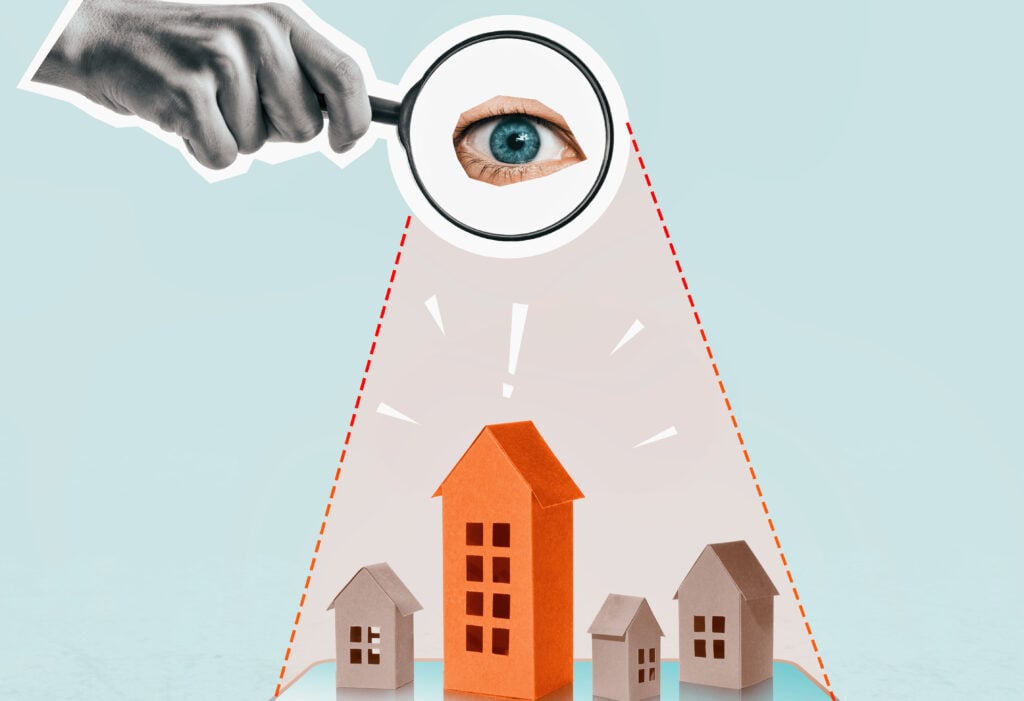Key Takeaways
- Real estate scams often involve wire fraud or seller impersonation.
- Watch out for warning signs like pressure to act quickly or suspicious communication.
- Secure platforms – like Closinglock – help protect buyers during transactions.
Most people only buy a home a handful of times in their lives, and due to the constant evolutions in the industry, the process is different each time. This means that, as a homebuyer, you may not know what to expect and might be more vulnerable to fraud as a result.
Thankfully, technology has made it faster and more efficient to purchase a home, but it’s also brought new challenges when it comes to security. A home purchase involves multiple parties, including title companies, mortgage lenders, and banks, so it’s important to understand how you can avoid bringing a fraudster into the equation, too.
What is a real estate scam?
Fraudsters target real estate deals because of the large sums of money at stake. These scams include everything from mortgage fraud to wire fraud and seller identity fraud. According to the FBI’s most recent report, Americans lost $12.5 billion to online fraud in 2023. This number was up 22% from 2022’s reported numbers.
1. Wire fraud
According to the Oxford Languages database, wire fraud refers to “any financial fraud involving the use of telecommunications or information technology.” For real estate-related schemes, the most frequently used forms of telecommunications are email and phone.
Fraudsters often intervene during the homebuying process by infiltrating email accounts, replicating a closing company’s emails, then sending their own updates to a homebuyer. These updates will include new wire instructions that look legitimate, but once a homebuyer wires their money, the funds are actually in an unknown (usually offshore) account and the wire can’t be reversed.
Because buying a home is a stressful process with many steps, most people don’t think to call their title company at a previously verified phone number, or to look carefully at the email address from which the new wire instructions have been sent.
One example of how fraudsters can trick homebuyers is by sending emails from an address that looks like one with which the homebuyers have already been in communication. [email protected] to [email protected] are two email addresses that look alike upon first glance, but are not actually from the same domain.
2. Seller impersonation fraud
Another real estate fraud tactic is seller impersonation fraud (SIF), which can take multiple forms. One example involves fraudsters posing as the owner of a property (sometimes as a deceased owner), selling the property they do not own, receiving payment, and then disappearing. By the time the homebuyer realizes the property they purchased was never for sale, the fraudster and the money are gone.
Another version of SIF is vacant land fraud. With this scam, fraudsters “sell” a vacant lot that they do not own, absconding with the money before the other parties realize what has occurred. Several warning signs the National Association of Realtors says to look out for regarding vacant lot fraud are:
a. A seller is listing a vacant lot for well under its fair market value.
b. All communication from the seller is electronic.
c. The seller wants to arrange their own remote notary. Remote notary fraud occurs when a scammer imitates a licensed notary, forging real estate closing documents.
What should you look out for in a real estate scam?
Beyond being aware of the different types of fraud scammers may attempt, there are certain red flags you can look out for. In addition, you should always contact your agent or the title company if you are having any doubts. Some red flags are:
- Documents already executed. If the title company receives executed documents before they were requested, it’s possible that a scammer is trying to provide everything needed for the deed transfer, to hurry everyone along.
- Pressure to act quickly. A fraudulent seller can pretend they need to close quickly so that the potential buyer does not have time to read all of the paperwork, or realize the property belongs to someone else.
- Vacant/non owner-occupied property. If the person claiming to sell the property lives somewhere else, make sure they actually own the property and have the right to sell it.
How can you avoid real estate scams?
Real estate scams are an unfortunate reality of homebuying, but by being aware and vigilant you can avoid falling victim to a real estate scam.
- Work with professionals you can trust.
- Avoid sending your personal information via insecure email.
- Be cautious about last-minute deals that seem too good to be true.
- Avoid off-market deals.
Thankfully, Closinglock was created to protect all sides of a real estate transaction from scams just like these. Our industry-leading Good Funds Payments tool allows buyers to send funds directly from their personal bank account to their closing company’s preapproved escrow account, all through Closinglock’s security-first platform.
In addition, Closinglock provides a secure portal which makes it easy to safely exchange wire instructions. As a settlement company customer, you can log into the Closinglock portal to upload or download the wire instructions needed for your transactions.
Our site’s SOC 2-certified data centers are managed by Amazon Web Services, and fortified with strong passwords, two-factor authentication, and state-of-the-art AES 256-bit encryption.
Let Closinglock focus on security, so you can focus on your next big move.
FAQs
What are the key warning signs of real estate fraud?
The most common signs of real estate fraud are requests for bank or payment information from unknown sources, and deals that are too good to be true.
What is wire fraud in real estate?
Wire fraud is when scammers hack into communication between buyers and title companies, diveriting money into fraudulent accounts.
How can I avoid seller impersonation fraud?
Always verify the identity of the seller and ensure they are the legitimate property owner before proceeding with a deal.
What should I do if I think I’ve been the victim of a real estate scam?
If you believe you’ve fallen victim to a real estate scam, immediately contact your bank to stop any transactions and report the incident to the authorities, including your local law enforcement and the FBI’s Internet Crime Complaint Center (IC3). You should also inform your real estate agent, title company, and lender, as they may help recover lost funds and prevent further damage. It’s essential to act quickly to increase the changes of recovery.


